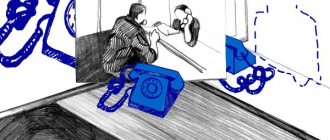When we hear about natural disasters occurring in different parts of the world, we always feel sympathy and compassion for the affected people. When a plane crashes, as a sign of grief, people gather near boards announcing the dead, bring photographs, light lamps... However, there is a disaster that passes unnoticed, as if it does not exist - prison.
According to statistics from last year, there were 650 thousand people in prison. More than half a million poor people whose suffering passes unnoticed by us. “But why are they poor? - you ask, - after all, they receive a well-deserved reward.” Indeed, people don’t just sit in prison, and all of them were sentenced by the court to punishment for some kind of atrocity.
It should be said that the psychology of the criminal dominates everyone. How many times have we broken the law ourselves, or encouraged others to commit crimes? Didn't follow traffic rules, maybe gave or took bribes? We justify ourselves in the fact that we are not criminals. After all, we weren’t convicted, which means we didn’t do anything wrong. “If you’re not caught, you’re not a thief,” says our folk wisdom, but many interpret it differently: “I’ll steal until I’m caught.” Therefore, the presence in our social environment of people capable of crime suggests that this is a problem not only of criminals, but of the entire society. The psychological boundary that defines the law is blurred. How many of us are familiar with the criminal code? We determine what is legal and what is not intuitively, based on the upbringing, traditions and ideals of the society in which we find ourselves.
Of course, most prisoners are in prison for crimes they have committed. But among them there are also those who ended up there because of an absurd incident, an accident. A classic example: a guy is walking with a girl. The girl heard, or it seemed to her, that she was insulted. The guy stood up, hit another person, a fight ensued, and the result was an accidental murder. Our guy is now a criminal, whose life will change forever, and that girl will probably forget him after a while - why does she need a criminal?... Another example: a woman lives with an alcoholic partner who regularly beats, rapes and robs her. No one cares about the life of an unhappy person - let her get out of it herself. Out of powerlessness and despondency, in a state of extreme despair, she grabs a knife and, in madness, hits the sadist countless times... The result is that the woman became a prisoner. Her life was already devoid of joy, and now it will be “decorated” with a prison term and subsequent criminal record. And with a criminal record, they will no longer be hired for any normal job - who needs a criminal prisoner?... “But these are all rare cases,” we console ourselves, “and the majority are in prison for the job and in truth.” That's probably true. But it should be remembered that a merciful attitude towards prisoners is commanded by the Lord himself. But to our shame, many Christians don’t even think about it.
On the other hand, it is important to remember that the consequences of one person's crime fall on the entire society. There is an instructive story by St. John Moschus about a woman named Mary. One day a certain passenger ship had to cross the Mediterranean Sea. But having entered open water, the ship could not move and stood there for 15 days. In a state of despondency, the owner of the ship turned to God for help, to which he received the following answer: “Throw Mary into the sea, and you will be saved.” The owner of the ship was very surprised and began to ask among the passengers which of them was Maria. Having found her, he asked to tell what happened to her. It turned out that Maria killed her two children in order to get married, and is now on the run. The owner of the ship dropped her into a lifeboat, which, of its own accord, immediately disappeared under water. After this, the ship reached its harbor without hindrance. Let's think about it, aren't there Marias in our environment who commit multiple murders of children through abortion in order to achieve the desired benefits?..
This article is addressed to those who are undergoing imprisonment for the first time, as well as those who are facing it. Although, to tell the truth, it can threaten anyone. As they say, “Don’t swear off money or prison.” In this article you will not find a way to “quietly” sit out and “calmly” leave without consequences, and this is impossible. Surviving in prison means not losing human dignity (if, of course, it is present at all in the first place), re-educating, correcting and recreating your personality.
A prison in Russia is more than a prison. The pages of our recent history remember that not only criminals, but also worthy, great people, including holy ascetics of Orthodoxy, sat and died in prison. The Russian prison has always been not only a place of deprivation of freedom, but also a tough school of survival.
If you only face prison
Regardless of whether you committed a crime or not, if you are facing prison time, then there is someone interested in seeing you go to jail. And you will definitely go to jail if you have committed a serious crime. In any case, it is important not to remain idle. At this stage, it is necessary to try to resolve the situation through agreement. You can negotiate compensation with the victim, and thus avoid imprisonment or reduce the sentence.
Find the courage to come to the victims and ask for their forgiveness, offer them your help or monetary compensation. “Make peace with your adversary quickly, while you are still on the way with him, lest your adversary hand you over to the judge, and the judge hand you over to the servant, and they throw you into prison; Truly I tell you, you will not come out of there until you have paid the last coin” (Matthew 5:25-26). Christian humility and prudence can be your release from prison. Saint John Chrysostom says: “Having reconciled, you will give up your property, but your body will be free; and when you subject yourself to the judge’s verdict, you will be bound and suffer the most severe punishment.”
Some people begin to deceive victims, promise them mountains of gold, and as soon as the charges are dropped, they forget everything. But we must remember that if the court does not punish, God can punish, and it is no longer possible to escape from this punishment.
If you are a Christian, devote your time to serving God. Practice fasting and virtue, start praying.
Diseases that prevent placement in a pre-trial detention center
Being kept in conditions that are difficult even for a healthy person can be fatal for a sick person. Therefore, if certain diseases are present, placement in a pre-trial detention center is denied. The lack of conditions that make it possible for a sick person to stay in an isolation ward and the low level of medical care have been repeatedly discussed at various levels, but no noticeable progress has been achieved. The list of diseases includes:
- the presence of parasites and dangerous infections;
- the presence of malignant tumors;
- thyroid lesions and diabetes mellitus;
- paralysis, severe forms of nervous system diseases;
- tuberculosis;
- AIDS, HIV in stages 4 – 5;
- vision problems, blindness;
- radiation sickness;
- amputations and injuries;
- necrosis, kidney and urinary system diseases, etc.
Regardless of the severity and type of illness, only a commission that issues a conclusion can release you from detention. The referral to the commission is drawn up by the investigator or inquiry officer in charge of the case. The medical unit consists of several wards in which prisoners receive inpatient treatment or medical care.
The medical unit cannot boast of luxurious conditions, but those under investigation or accused can, if necessary, consult with specialists in various fields and receive medications/procedures.
You can make an appointment with specialists from paramedics on duty around the clock. In addition, paramedics can be called to a patient at any time. If a patient requires hospitalization, the security inspector sends an escort convoy with him by ambulance.
Pre-trial proceedings
If it was not possible to resolve the issue peacefully, or the crime you are charged with is quite serious, then the pre-trial procedure will begin. It can go differently, but one question will be decisive for you: will you be locked in a cell or released.
You need to come to terms with the fact that law enforcement officers will constantly be interested in you. Therefore, immediately decide what you will tell them and what you will not. What is your fault and what is not. Also, think ahead about what you will and won't say on camera. Until the court finds you guilty, you may not say anything at all to the rest of the prisoners about all the circumstances of your case. Remember two basic rules - “...by your words you will be justified, and by your words you will be condemned” (Matthew 12:37) “... let your word be: yes, yes; no no; and anything beyond this is from the evil one” (Matthew 5:37).
During this period, law enforcement officials are preparing your case to submit to court. Therefore, their goal is to create a picture of your crime as detailed and complete as possible. At this stage, certain problems may arise, because according to the logic of law enforcement agencies, if they detained you, it was not without a reason - no one likes to make mistakes. Depending on the severity of the crime, the attitude towards you will be different. Nobody likes people who have committed brutal crimes, neither law enforcement officers, nor those with whom you may have to sit.
Another factor influencing the quality of your stay under investigation is the personal moral qualities of police officers. If the employees’ goals include bringing you to prison at all costs, and perhaps pinning some other crimes on you, they will achieve this by all means - from psychological to physical influence. If you withstand the onslaught, you will gain respect; if not, then everyone will understand what you are afraid of and how they can influence you.
A lot depends on you. If you immediately begin to insult everyone around you, behave inappropriately, or, on the contrary, go to the other extreme - you begin to ingratiate yourself, lose self-respect, then nothing good will come of it. Conduct yourself with dignity and respect for all people on both sides of the fence.
Once in the cell, you need to immediately learn the most important principle - not to be afraid. There are many things that frighten you in prison - they can beat you, rape you, kill you. All this, perhaps, may happen to you, but for now these are only fantasies, and you can and should learn to control them. There is no need to fantasize about anything: neither that you will be miraculously freed, nor that you will be brutally dealt with. You must learn to live in the specific moment you are in at a given time. Misbehavior in a cell can come back to haunt you much later, when you find yourself in prison.
Try to find a way to let your loved ones know about you. Reassure and support them if possible. It may not be easier for them now than it is for you.
Pre-trial detention centers and temporary detention centers
In pre-trial detention centers and temporary detention centers there are: - “first-timers” (those who received their first sentence); - “overstayed” (those who are not serving their first term).
There are no assaults in prison, people have their own worries and affairs, the main thing is to behave correctly. Much depends on your behavior in prison, in particular, the attitude of the group of fellow inmates towards you.
To begin with, you will be placed in a temporary detention facility, and later you will be sent to a pre-trial detention center.
Choose your words when communicating with prisoners, but at the same time, do not forget about the rules of decency.
Also, polite treatment of employees plays an exceptional role while in prison. In order to “spread rot” on you during interrogation, employees need to be prepared.
The social status of the accused is also important for the employee. People who end up in a zone or indoor prison (SIZO) are not accidental. It seems to you that in front of you is a homeless person who is shaking from drinking, and when released, this homeless person may turn out to be an authority. If you heard insults from this person, then you will not be forgiven for this: once you find yourself in a cell with him, it will not be at all sweet for you.
The court found you guilty
So, you are a criminal, the court decided so and sentenced you to imprisonment. It doesn’t matter anymore whether you committed a crime, were just about to, or were slandered. Now you are a convict, or as they usually say, a prisoner. There is no point in biting your elbows and shedding tears. You need to decide who you are. Yes, it is clear that a person who, by the will of fate, ended up in this terrible place. You will be surprised, but in prison they respect people of honor, speech, character and education. Rotten, two-faced and traitors are not liked even there. If your goal is simply to survive, to hold out until liberation, if you are driven by animal fear and you are ready to do anything just to be beaten and touched less, to be fed more, then this is the path to hell. It is likely that you will be able to survive until your release - the police will not let you die in prison, although it happens that they are powerless to protect the prisoner. In any case, such a path can hardly be called life. Choose the path of faith. Place God's law as the foundation of your entire life and obey it carefully. “Behold, I command you,” God says to Joshua, “be strong and courageous, do not be afraid and do not be dismayed; For the Lord your God is with you wherever you go” (Joshua 1:8–9).
First steps - getting into the chamber
As soon as you enter the cell and its door closes, the first thing to do is greet everyone. This is done in the same way as in ordinary life, you can say “hello” or “good afternoon” - depending on the time of day. It is very important to ensure that your words do not offend anyone; swearing, even jokingly addressed to prisoners, can have very serious consequences. There is no need to show that you are a “seasoned convict” who knows the “thieves’ deal” if you have no idea what you are talking about. You will be easily seen through, and your behavior may be regarded as sycophancy or ingratiation. The surest way is not to chatter anything related to what you got caught for, speak dryly and briefly. Do not react to stupid jokes, especially to provocations in the form of jokes. However, there is no need to remain silent. The interest of your cellmates in your person is caused by the desire to find out who they are dealing with.
How to behave when detained
On June 3, 2015, an event occurred in my life, the development of which changed my entire understanding of the judicial system in the Russian Federation, about people holding positions in law enforcement agencies, as well as about all our laws and their application to Russian citizens.
All this happened in one of the northern cities. At 19.30, as usual, I had dinner in one of the cafes of our wonderful city. Of the visitors in the establishment, there were only me and a girl; we had a business meeting with her, at which we discussed the upcoming private screening of one of the films that had recently been released in cinemas. I finished my meal and pushed the plate away from me, when suddenly people in masks and several in civilian clothes burst into the cafe, there were about 15 of them in total. They ordered me to raise my hands and indicate whether I had prohibited items on me, a knife, a pistol or anything else. . After that, they handcuffed me and, bowing my head, took me outside. They put me in a car that was unfamiliar to me and drove me to an unknown direction.
In such cases, I recommend not resisting, speaking as politely as possible, and most importantly, don’t panic!
And from that moment all the most “interesting” things in my life began.
Life in the zone
From the first days of your stay in the zone, you need to get used to the idea that you are one of the prisoners. The people with whom you will live side by side have characteristics that will not always be pleasant to you. Life in the zone takes place in a very cramped space, so in addition to the administrative rules of the colony, there are also unwritten, “thieves’” rules. They may seem strange and stupid, but the quality of your future prison life depends on their implementation. Of course, if you have never sat in prison, you do not know these rules, but this does not relieve you of responsibility for failure to comply with them. There is always a senior person in the cell to whom you can turn for clarification. One of my acquaintances, who previously had extensive experience of life in prison, answered the question about how to survive in prison. According to him, the best way is to be a “man”: “All your actions and words must be worthy of the title of a man. Guys, these are the most crystal clear people who work, want to quickly return home, and never sit down again.”
Prison and life behind bars
When you find yourself in captivity, you need to immediately understand one thing - there are no bosses among the prisoners. How you position yourself is how you will live. Another postulate is that in closed communities (kindergarten group, school class, comrades in the yard, work collective, cellmates or neighbors in a barracks) there is no equality. Where more than two gather, division immediately occurs into suits or castes. Order comes first! Before going to prison, I was not a criminal person at all. It so happened that I didn’t even know anyone with a criminal record. I played sports and worked in a fairly prestigious position at the time. And then one day, having rudely received a debt from a scumbag, he ended up in a pre-trial detention center.
In those days everything was both simpler and more complex. What I mean is that for the first time those arrested were not put together with repeat offenders. In captivity, we established our own rules.
As I remember now, they brought us to “Kresty” on Friday afternoon, threw us into the basement “dog house” - this is a cell, a quarantine. No movement was expected until Monday—that’s what the pre-trial detention center officer told us. He also explained that today we are not on allowance. In the bullpen (temporary detention centers did not exist then) they were fed once a day. I really wanted to eat, especially since we were all young and strong guys. Bandit from Kazan and I immediately became friends. Five unathletic-looking guys were afraid of us, although we didn’t touch anyone or run into anyone. Naturally, it turned out that the guys all climbed onto the upper deck. Kazan and I settled down below. We talked for three hours, it became boring. We politely asked the “nerds” to tell us a joke. They talked all sorts of nonsense for a long time. We laughed not from subtle humor, but from their efforts. Then we, just as politely, without any pushback, asked the young people to show us the theater. Two young men crawled out to the door under a light bulb and depicted all sorts of animals according to our order: eagles, snakes, skunks, nits. Notice that we didn’t lay a finger on anyone, but we immediately took a dominant position, and the weak in spirit willingly submitted.
On Monday we were sent for a medical examination and fingerprinting. It was noticeable that our neighbors were noticeably slowing down. They looked around and could not name their data and articles without hesitation. The staff did not see them as native prison inmates and treated them roughly. Kazansky and I, on the contrary, immediately began joking with the guards, and the guards, looking at us, laughed.
It was a pity to part with the Kazan bro, but after we were given bed linen, we were assigned to different cells.
To be honest, I was a little nervous. I remembered films with tattooed, stern men. But then the door opened and I entered a small, dimly lit room. On both sides there are three-tier bunks for six sleeping places and for fifteen prisoners. All of them were not at all scary in appearance. Rather, on the contrary, pale to blue due to lack of sun and thin from poor nutrition. The oldest is twenty-five years old. He said hello, sat down on the lower tier, and threw the mattress at the entrance. Traditional questions rained down: what article am I serving under, where am I from, how is it going outside? In general, we met.
All had no previous convictions. They were imprisoned, in general, for nonsense - drunken murders and unsuccessful robberies. They tried to sell me on the fact that the new guy washes the dishes and floors for everyone before the other newcomer arrives. I proposed another rule, so that the “old people” would do this, as if they had already mastered all the tricks of the garbage trade.
Tall Kolya was the most impudent of all. He spent a long time under investigation and was in more than one cell. The guys did not respect concepts, even human ones. Everyone did what they wanted. For example, everyone is sleeping, and two people are talking loudly at this time. Or they eat someone else's food if its owner is mentally and physically weak.
Three days later, Kolya was transferred to another “hut”. By that time, I had settled down enough, and even showed people part of my fighting arsenal. It all happened by accident. We talked about the sharpness of the blow. I asked him to hold a piece of newspaper by the upper corners and, having warmed up a little, punched it in the middle with my fist. The leaf didn't move, but it tore a little at the point of impact. For an experienced boxer this is not difficult. Naturally, no one repeated this in the cell.
To be honest, at that time I knew nothing at all about criminal concepts, but by chance I established them. Although there is nothing random here - the rules of good manners are the same everywhere. He suggested that the neighbors behave decently, don’t yell, don’t disturb others, share the parcels equally, and clean up every day. Everyone agreed. Only one Georgian did not like it. Or rather, I didn’t like the fact that he wouldn’t be in charge. I had to give him a little bit of offal to keep him from protruding.
"Walk, bros!"
We began to live like white people. Some were dragged to trial or transferred to another cell. We also received newcomers. And it doesn’t matter whether they came from outside or had already spent time in a pre-trial detention center, everyone was a little afraid. Only some hid it behind arrogance and behaved strangely. To the point where they pretended to be creepy, imprisoned authorities.
Only then did I understand why those who had just been imprisoned get tattoos and adopt the customs of the prison. This is just mimicry, so that they are accepted as one of their own, not humiliated or beaten.
Take this case, for example. The cell is quiet, someone is sleeping, someone is reading. Suddenly the door opens and something comes in. You can’t see it behind the mattress, but it barks loudly: “Hello, lads worthy of respect! I’ll be the fuck, in kind, yeah.”
The mattress falls to the floor, those who woke up and put their books aside look at the new inhabitant of the “hut”. The big bald head is covered in fresh cuts from the blade. It's cold, but he's wearing a T-shirt. All the arms, shoulders and neck are covered in tattoos - terrible scars, inflicted with a blunt needle.
We were very interested in this phenomenon. The “passenger,” twitching and conducting himself with his hands like a paralytic sign language interpreter, continued the concert. Alternately winking at us with both eyes, patting each of us on the shoulder in encouragement, he shouted: “Why, really, they’re so sad - in prison everything is ours - it’s a “black” move! Walk, bros!
No one responded to his tirade. The newcomer hesitated a little, ran along the central aisle (five steps in both directions) and cheerfully suggested: “Well, what, tramps, let’s chifirm like a prisoner.” I realized that I could have fun, put on a naive face and explained: “We, dear man, are pioneers. We don't know how to chifir. Here’s some tea (forbidden at that time and bought from a balander for a good jacket), you brew yourself, and we monkeys will watch.”
There were no sockets in the cell at that time. The passenger resolutely tore off a piece of the blanket, smeared an aluminum mug with soap (to prevent soot from sticking), hung it over the toilet and set the “torch” on fire. He boiled some water, generously poured in some tea, and steamed it. Sits, chokes on one sting. It’s obvious that he’s not used to the thick drink. He grimaces and feels very sick, but he holds on - after all, all repeat offenders drink chifir.
I asked him: “Tell us, O wise one, why do they slurp chifir? Have we heard that it makes you cum?” The chifirist bent over and croaked (they call this sound laughter): “In reality, earth, who brought you such a crap? It just gets the chifir’s blood pumping and invigorates. No matter how much I drink it, I feel like a fool.” “It looks like you haven’t drunk for a long time,” I noted. “Maybe you just need to do push-ups to get the blood flowing?”
The newcomer did not understand the bait and began to tell us about prison customs, prison brotherhood, and the general movement. He was talking nonsense with the most intelligent air. It turned out that he had only been in prison for two months. But before us, he ended up in a “hut” where everyone plays prison. We even liked it. We constantly bothered him and asked him to tell us about how to go to the toilet or approach the door, how to address an employee and each other.
A wise neighbor condescendingly enlightened us, the inexperienced. After a few days, we got tired of the circus, and we kicked him out without any mayhem. They played cards for a wish and he fulfilled it. A nice female sergeant opened the door and invited us for a walk. Our criminal guru screamed wildly: “Boss, open the door wider, fingers won’t get through!” Then he tore his T-shirt, revealing his tattoos, spread his palms and, singing “How many have I stabbed, how many have I cut, how many souls have I ruined,” headed towards the door. The employee had never seen such fear. She forgot to slam the “gate” and rushed down the corridor for help. After a showdown with the guards, the tattooed citizen was removed from us - he himself asked for it.
The next day, a small azer was thrown in its place. The fact that he got into prison for drugs was visible from afar. The newcomer was not afraid of anyone, because he did not think well. From the doorway he asked if we had any pills. Doctors on rounds gave me analgin, citramon and other cheap medicines. We took them in reserve and accumulated a fair amount. Some “wheels” could not be identified due to lack of packaging.
Thinking that the man was feeling unwell, we handed the newcomer a first aid kit. He was delighted. I poured water into a mug and threw all the pills into myself! He even ran a wet finger along the bottom of the bag and rubbed the dust into his gums, as they do in the movies with cocaine. He didn't want to meet anyone. He laid out a mattress right next to the door (there were no free bunks), covered himself with a blanket and began to drag himself around - he made a blissful face, rolled his eyes and began to masturbate.
We were shocked by the public mastery of ourselves. But the new neighbor did not react to external stimuli in the form of shouts and kicks. We remembered the tattooed “clown” with longing. There is nothing to do, the guard shouted and showed him the onanist. The ensign understood everything and called the orderlies from among the convicts. They took the sick man away in an unknown direction. The officers really didn’t like the fact that they were putting the inmates on skis from our cell. As the instigator, I was removed as punishment. They even promised to throw me into the “press hut.” Preparing to sell my life and honor dearly, I followed the building officer up to the fourth floor.
It turned out that “press” comes in different forms. In those days, there was an article providing for criminal punishment for violating the passport regime. Citizens without a passport or registration were put in prison. For the winter, the homeless themselves were eager to go to jail. It was to these very neglected homeless people that they threw me.
I didn’t dare go forward: there was ankle-deep debris on the floor - scraps of newspaper, bread crumbs, etc. A clogged and overflowing toilet stank to the side. The aborigines of the heating main added to the stench of the toilet. They were lying on the floor and on the bunks, all covered in boils, with swollen joints and covered with lice. I've never seen lice form complex patterns. Nobody greeted me - only a joyful exclamation was heard from the side.
A young, muscular guy in a white T-shirt stood against the wall. He said that he had been here since yesterday, but he couldn’t even sit down. The guy heard that you can’t “break” out of the cell - it’s a “jamb.” I had a different opinion. Camera and camera are different. I don't like sitting here.
He knocked on the door with his feet, called the duty officer, showed us the conditions of detention and secretly said that if the pumped-up man and I were not transferred urgently, we would be injured by several whips. He came to the front, looked into the “hut”, looked at the athlete and me and commanded: “Get out with your things.” In the corridor, I took a deep breath for the first time in an hour.
About the dangers of developed muscles
With a new acquaintance, we were thrown into a cell where the “passenger” who had just arrived there was sitting. It’s strange, but in “Kresty” none of the prisoners are left alone, so as not to hang themselves.
I didn't like "Passenger" right away. The boy himself was from a small village, but he pretended to be a tough mafioso and an expert on prison. I politely asked him not to stink with his pipe and terry. He was deflated and smoking at the door through the crack. Soon another neighbor was transferred to us. As it turned out later, on the day he came of age, he was lifted from the “youngster” (they were also kept in “Kresty” at that time). The guy from the corridor immediately appreciated me and the pumped-up athlete. He threw the mattress and bag, pushed away the guard and rushed with a cry of “They’re killing me!” run. Strange, we thought, and looked questioningly at the door.
Everything became clear later. Before us, lawless bandits sat in this “hut”. They broke the people, which the opera took full advantage of. Bad rumors spread around the prison about this “hut”. So the former “youngster” mistook us for “press officers”. The officers spent a long time convincing him that there were good guys in the cell. We confirmed this too. The young man seemed to believe it, but for a long time he was afraid of us. A little later they threw another one at us. He had just been released. The guy was only eighteen. This “new resident” stood at the door and looked at me and the athlete with horror. I had to make a proposal to always wear long-sleeved shirts and not show off my muscles. The proposal for a burqa on the face did not pass.
The karate pimp walked in calmly. He had been at Kresty for a long time and knew all the rules here. The sailor didn’t slow down either, just like the “threw” Georgians. We began to live calmly, observing the rules of socialist society and not interfering with each other.
Since I sleep quietly and peacefully, I even curtained the top of the sheets. The “youngster” suddenly slowed down, pulled a nail out of the frame and began hammering it into the wall with an enamel mug. The athlete ran into him. Then the door opened. I leaned out from behind the curtain and glared at the idiots who were making a fuss. A respectable man just came in (as it later turned out, the previously unconvicted leader of a well-known organized crime group). As he later admitted, the police department promised him a “press hut” in prison. When he saw me and the athlete, he thought that this was it, it had begun. For two nights he did not sleep, but only pretended to be asleep, fearing that we would attack him while he was sleepy.
Everyone had their own challenges. And this despite the fact that we met newcomers normally, even crazy ones.
Triple Murderer
We had just settled into the cell when the door opened again and another “passenger” loomed at the entrance. It was useless to say that we had no sleeping places. As an argument, the employees usually told us about the “hut”, where eighteen snouts lived on the same nine square meters.
A very neglected middle-aged man was pushed into our room. We were the first to greet him and invite him to come along. He did not answer - he sat down on the bunk and said that his mother-in-law had recently come to see him (according to the indictment, he drunkenly shot his mother-in-law, wife and neighbor with a hunting rifle). This deceased mother-in-law, like, told him about us all. Then the killer told us what terms we would receive. In general, each of us received at least fifteen years or the death penalty - execution.
We were not superstitious people, but he ruined our mood. They gave him a sausage sandwich and put him to bed. Back then it was not a good idea to sleep under the school - in the summer it’s generally the best place, where it’s not so hot. We also went to bed. Only the triple killer kept arguing with his mother-in-law in a whisper. I dozed off to the sound of his muttering, and so did the neighbors. The newcomer saw a hidden sharpening point for cutting bread under the pin. Along the way, he completely quarreled with his wife’s late mother and decided to get rid of her. The killer took a homemade knife and started to cut the leader of the organized crime group, mistaking him for his mother-in-law. It's good that I woke up and kicked the psycho. The leader of the organized crime group jumped up. Then the killer rushed at him again. Only against a heavyweight boxing master of sports there is little sharpening. We didn’t beat the idiot, but simply called the guard and asked him to place the patient in a hospital. The operative came and said that the mokrushnik was acting like a fool. to avoid the “tower”, and ordered him to be transferred to another cell.
A little later, the corps officer opened the “feeding trough” and told us that our “hunter” had ended up in the “hut” where the repeat offenders were sitting, and right from the doorway began to hit them in the faces. At first the authorities were taken aback - they thought that it was special forces in civilian life who had shown up or that the government had changed and the thieves were being destroyed. Then they sorted it out and beat the psycho themselves, so much so that they later put him in the hospital.
You gotta be yourself
They sent us an Azeri again, this time healthy. Seeing that we were peaceful people, he sat down and began to lie. For two hours he did not close his mouth at all, saying that he speaks all languages, knows all the rulers, earns billions, shoots accurately and enjoys success with stunning blondes (although, in my opinion, he only impregnates monkeys, and then by force).
At first we were entertained by his chatter. Afterwards I politely asked him to be silent or read the newspaper, but he continued talking. Then I asked him to read the newspaper silently. The newcomer started yelling and insulting me, for which he got punched in the face. I didn’t have time to add anything - the neighbors separated me. The victim hid under a bunk and from there glared at me with hatred. I calmly explained to him that if I tell him, no one will interfere. Either let him stop staring, or we need to figure it out one on one.
He did not dare to fight and stated that he was being persecuted on ethnic grounds. Our Georgian noted that you just need to behave normally. A couple of days later I had a trial and was released.
This short landing taught me a lot. Suffice it to say that the next time I was imprisoned in the provinces, I went to the quarantine pre-trial detention center, returning from the trial, “looking after” the prison. It didn’t even occur to him to ask me to give him the corner bunk (assigned to a criminal by rank) on which I was located. The “supervisor” and I immediately saw each other as equals - people who knew how to behave in captivity, although he had been incarcerated for twenty years, and at that time I had only a few months in a pre-trial detention center. I already said at the beginning: how you position yourself is how you will live.
Igor Zalepukhin Based on materials from the newspaper “Behind Bars” (No. 2, 2011)
How not to become an outcast
Everyone knows that in prisons sometimes violence occurs against prisoners - “lowering”. Traditionally, people of a special caste are considered degraded in the zone; these are either passive homosexuals or raped prisoners. But at the moment, the concept of omitted has changed somewhat and become broader. The process of lowering itself initially consisted of sexual abuse; now this is not often practiced. In order to transfer a prisoner to the lower class, quite serious reasons are needed, such as theft from other prisoners, betrayal, and others. It is not necessarily carried out through sexual intercourse. This could be defecating on the prisoner, or other humiliating acts.
But it often happens that people fall into disgrace without any act of violence at all. For example, people who come to the zone with homosexual experience are automatically equated with those who have been rejected. There are those who sell themselves because of hunger, or for some services. In general, in order not to become dejected, you need to be able to behave wisely and honestly. Try to follow the prison rules, remember the words of the apostle. Paul: “...to those under the law he was as one under the law...” (1 Cor. 9:20).
Special regime - the highest measure of criminal punishment in the Russian Federation
During the period of the moratorium on the death penalty, the most severe sentence for a criminal in Russia is to serve the sentence in a special regime colony. In such penal colonies, prisoners are kept in extremely harsh conditions:
- in solitary confinement or in cells for a maximum of 2–4 people;
- with additional bars separating windows and doors in cells;
- in conditions of constant lighting under video surveillance 24/7;
- without the right to communicate with cellmates;
- subject to the requirement of moving around the prison in a bent position, handcuffed behind the back, under escort of several guards and a dog handler with a dog;
- in conditions of limited walks in a closed courtyard, deprived of sunlight;
- in complete isolation from prison society (even special regime prisoners work in the workshops of their own building, a maximum of three people each);
- without the right to correspondence and visits during the first 10 years of imprisonment.
Mainly those who received life sentences are kept in special regime colonies: serial maniacs and murderers, cannibals, terrorists, founders of organized criminal groups (OCGs). This also includes former residents of general and strict regime penal colonies who committed serious crimes while serving their sentences.









